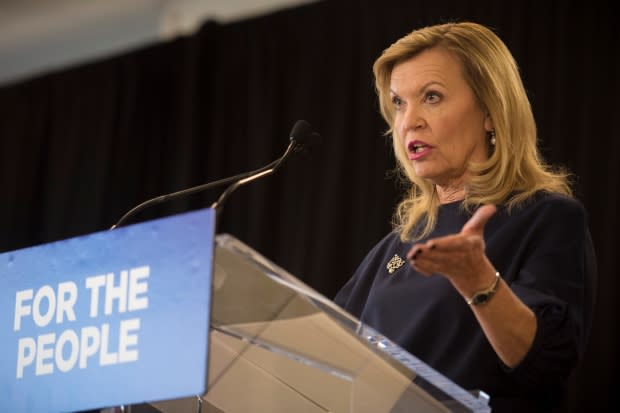Ford government creating Ontario Health super-agency
The Doug Ford government is creating a central agency called Ontario Health to oversee the province's $60-billion health-care system.
The super-agency — unveiled Tuesday by Health Minister Christine Elliott — will be formed by dissolving the 14 Local Health Integration Networks (LHINs) and merging their duties with those of six provincial health agencies, including Cancer Care Ontario and eHealth Ontario.
CBC News was first to reveal the health-system merger plans with a report in January on the provincial government's intention to dissolve the LHINs. Since then, leaked documents obtained by the NDP, including draft legislation, revealed more about the changes the government was considering.
Six agencies that will be consolidated under Ontario Health, in addition to the 14 LHINs, are:
Cancer Care Ontario.
eHealth Ontario.
Trillium Gift of Life Network.
Health Shared Services.
Health Quality Ontario.
HealthForce Ontario Marketing and Recruitment Agency.
Elliott said Tuesday that work overhauling the system will begin in the spring, but it will take years for it "to become mature."
The changes will be contained in new legislation, the People's Health Care Act, 2019, which Elliott will table in the legislature Tuesday afternoon.

Elliott also unveiled details of her plans to encourage hospitals, long-term care facilities, home-care agencies and other health service providers to form "integrated care entities."
The Ontario Health Teams will be made up of local health-care providers and organized to work as a co-ordinated group, Elliott said. The teams will be built to "guide patients" among various care providers and help families through transitions between providers.
"They would take the guesswork out of navigating the health-care system," Elliott said.
Under the plan, each newly formed grouping would receive a single block of funding and work together to deliver a range of health-care services for the region they cover.
The government is asking health providers to make proposals for forming the groups, rather than force them together. The goal is to have between 30 and 50 health teams in the province, Elliott said. Each team will be responsible for about 300,000 people, but that could vary based on factors such as population and geography.
Asked how the changes will affect family health teams, which were formed years ago to bring together family doctors and other practitioners, Elliott said they will continue to operate and Ontarians' ability to access their family physician will not change.
The new Ontario Health Teams will be responsible for managing all care in a specific region, she said. But people will continue to get home care as they always have, they will continue to see their physician as they always have."
Asked repeatedly what the changes mean in terms of cost savings or administrative job losses, Elliott would not provide specifics on either point. The news release touting the changes does mention "eliminating duplicative back office infrastructure and administration."
In background materials provided by the government, it says that each of the six agencies being rolled into Ontario Health has a full senior management team and administrative support, "and over time some of this work has become duplicative."
Elliott also announced new digital health-care tools, including secure access to various tools such as virtual specialist appointments and secure access to electronic health records.

On Monday, Elliott spoke to reporters at Queen's Park in Toronto and said the changes will "significantly reduce hallway medicine by making sure that people find the care that they need."
"This is something that we have thought about long and hard," she said.
"What we really need to do is focus our health-care system on the patient. That's what the centre of all of this is about, is to make sure that patients' needs are considered and thought of first and foremost."
NDP Leader Andrea Horwath said Monday she is worried that the super-agency model will allow for contracting of health services to the private sector.
The looming changes, as well as complaints the previous government failed to tackle the hospital overcrowding problem, have the Liberals on the defensive.
"I'm not going to say that we solved everything," said interim Liberal Leader John Fraser.
"Anyone who tells you that they've got the solution to health care, they're not being truthful with you, because it's constant work. You're never done."

